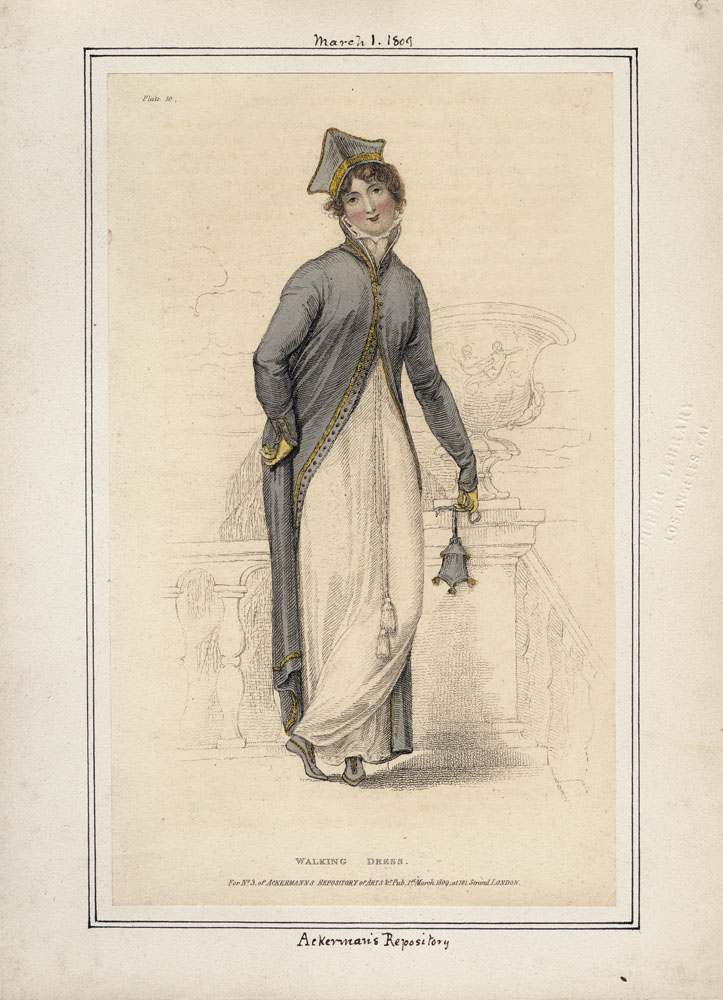Recently, I've been thinking about the reticule, so often included as a little extra in reproduction sewing patterns...a little bonus to complete your period look. Yet, how many of us actually know anything about this supposedly ubiquitous 19th century fashion accessory?
First, let's start with the name. I've heard it said and seen it written that the term reticule was derived from the word ridicule and were thus interchangeably called ridicules and reticules. The story goes that reticules were seen as an impractical fashion accessory and were as such deemed ridiculous and given the moniker of a ridicule. Well, being an inquisitive sort I decided to embark on a little research expedition. A search of any online dictionary reveals that the word reticule has its roots in the Latin word reticulum, meaning "netted bag" with the origin of reticule being placed in 19th century France. Further investigation traces the first known printed usage of reticule to Katherine Wilmot who wrote of the "little workbag" in a letter dated 1801 (An Irish Peer on the Continent 1801-1803). Interestingly, a reticulum in ancient Rome was a netted hair accessory much like a snood and according to Karen K. Hersch, The Roman Wedding: Ritual and Meaning in Antiquity, inspired both the name and form of the reticule (Footnote 192, pg. 108).
 |
| Portrait from Pompei in which the subject wears a reticulum. |
Now to look up the definition of ridicule and we find the word is most likely based on the Latin ridiculum and originated in France during the 17th century (1690 in print). As you might guess the definition seems to have always meant to subject someone or something to mockery and derision. The Latin ridiculum actually means "to neuter"...ouch. The use of ridicule as a noun began around 1700 and here are two examples of the word's use as such and seemingly by these prints to mean someone that is an object of...you guessed it...ridicule.
http://images.library.yale.edu/walpoleweb/fullzoom.aspimageid=lwlpr03351 http://images.library.yale.edu/walpoleweb/fullzoom.asp?imageid=lwlpr03417
So, now we know what our words mean. In my mind, this tells me that the term reticule was derived from the very logical Latin term reticulum, meaning "netted bag" and most likely any interchange between the two terms arose from the perfect opportunity for a little humorous word play. Also, keep in mind both the British and American ability to mispronounce French words...perhaps the interchange comes from an honest mistake of hearing the word wrong. Try it for yourself...pronounce ridicule and reticule in succession...it's much harder to tell them apart when only listening to the words...now, imagine those words passing between French and English and a mistake in hearing seems very likely.
 |
| Reticule |
Perhaps we can best sum this up by consulting the quite awesome World Wide Words http://www.worldwidewords.org/qa/qa-ret3.htm
"The reticule was indeed sometimes slangily called a ridicule during the early nineteenth century, but it was either an ignorant or a joking transformation of the older term. Charles Dickens used it in Oliver Twist in 1838."
There you have it...I blame Charles Dickens for this whole ridiculous reticule mess! Ahh...but, I fear that Americans had some hand in this as well and that the dilemma existed long before Dickens put pen to paper. The book, Historic Dress In America by Elisabeth McClellan, gives mention of a Philadelphia magazine that in 1808 wrote, "no lady of fashion now appears in public without a ridicule - which contains her handkerchief, fan, card-money and essence-bottle" (pg.82). This would appear to offer proof that the reticule was indeed known as a ridicule. Yet, from this reference we can't know if the term ridicule was a mistake in writing, hearing or was truly known as such. Whatever, the case it seems clear that the word ridicule well predates reticule and that the first written description of such an item refers to it as a reticule. If the two terms came about to be used interchangeably then I'm led to believe that a reticule was first known as a reticule and only later a ridicule whether by mistake, humor or both. So...what do you think? Now I wouldn't partake in all this talk of reticules and not give you lots of pretty pictures...stay tuned for the next installment...PRETTY PICTURES are promised!

Just found the word "ridicule" meaning a lady's bag, in Jane Austen's Emma. Very pleased to have the derivation explained as haven't found it even in the biggest dictionaries
ReplyDelete